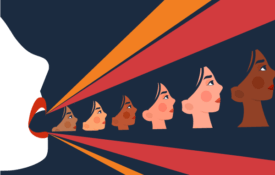-
The Point of the Cruelty
When a reporter asked Richard Daley, then the mayor of Chicago, whether his gun-control policies were effective, Daley pointed to a rifle and shouted, “If I put this up your butt, you’ll find out how effective this is!” Rahm Emanuel, a political operative who would also go on to become mayor of Chicago, mailed a dead fish to a pollster who had delivered results late. Tony Banks, a member of the U.K. Parliament, once publicly said that another member was “living proof that a pig’s bladder on a stick can be elected to Parliament.” In many workplaces, those sorts of comments and actions could cost people their jobs.
-
The ‘Great Realization’ Has Inspired People To Seek Happiness In Their Jobs And Careers
It's hard to be happy. Right now, parts of the United States are burning with wildfires, hurricanes are hitting the East Coast, the Delta variant is sending people to the hospital and we’re watching the horrific situation in Afghanistan play out in real time. There are real concerns over keeping our jobs and what our futures will look like. The pandemic is a constant cold, stark reminder that life is fleeting. We’re not invulnerable. Good people get sick and die. This brutal recognition could be both saddening and invigorating. People could either throw their hands up in despair or take action to improve the quality of their lives.
-
Universities Say They Want More Diverse Faculties. So Why Is Academia Still So White?
When she was hired as a professor by Harvard University in 2013, Lorgia García Peña was the only Black Latina on a tenure track in the university’s Faculty of Arts and Sciences. But in 2019, she was denied tenure even though her department chair and two deans had told her that she should apply for early tenure. Her tenure committee also unanimously recommended she be promoted, and another committee above that endorsed its recommendation. About two years later, famed professor and public intellectual Cornel West announced that he, too, was leaving Harvard after the university refused to grant him tenure.
-
Compassion As A Business Objective: Why It Matters And How To Cultivate It
Is being a compassionate leader good for business? Think about your career. Think about the best manager or leader you ever had. What traits come to mind when considering what made these leaders exceptional? Did you describe these leaders as disciplinarians? How about fiercely competitive? Were they unpredictable, too? Chances are you weren’t thinking about any of those traits. It’s more likely you thought of descriptors such as passionate, trustworthy, calm in the face of adversity, present, connected, sensitive, service-oriented, empathetic and encouraging. Any of these could be used to describe a compassionate leader. So why are compassionate leaders so important?
-

Microaggressions: What We Know and Should Know
Monnica Williams, a researcher at the University of Ottawa, discusses the study and impacts of microaggressions.
-

Current Understandings of Microaggressions: Impacts on Individuals and Society
The latest issue of Perspectives on Psychological Science is dedicated to the singular topic of microaggressions: statements, policies, and environmental cues that carry racial and prejudicial overtones.

